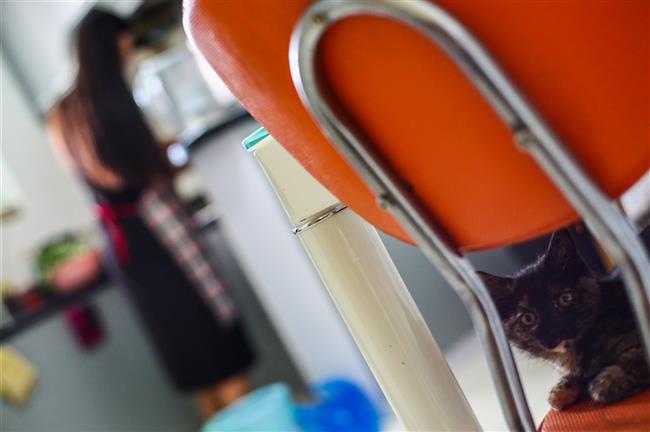'Empty nesters' with little to chirp about
Esther Cheng, 28, lives in a city of 24 million people and still feels alone.
She received her master's degree some two years ago and now works as a researcher for a pharmaceutical company in Shanghai.
Home is a studio apartment near a commercial zone, but she's not there much because her job requires a lot of overtime. Breakfast is usually a cup of coffee from a stall at the Metro station; dinner is usually skipped.
Day in and day out, the same routine. No time to make new friends. No time to find romance.
“All my family and friends are in my hometown in Hebei Province,” Cheng says. “I go to movies alone. I dine out alone. On rare occasions, I have time to invite a colleague or two to my apartment. That's the sum total of my social life."
Cheng says she recently learned there is a popular term on social media for people like her: "empty nesters." It was originally coined to describe older parents who are left lonely when their children grow up and leave home. But now the term has been expanded to include young people who leave their hometowns to work in big cities but haven't been able to settle in their new environments.
Cheng feels bittersweet about her nesting situation.
“To be honest, I often wish there were someone waiting for me when I get home from work," she says. “But on the other hand, it is nice to know that I am not the only one enduring loneliness in an unfamiliar city.”
One study at the end of 2015 estimated that 20 million people in China were living alone. No recent figures are available, but the number has almost certainly risen, especially with so many young people unwilling or unable to marry.
People who live alone for a long time often tend to be downhearted and socially awkward, to be unhealthy and not eat well, to be workaholics and to be untidy.
Cheng says she fits that stereotype perfectly.
“My room is usually a mess, and I don’t do laundry until I run out of clean underwear," she says. “I can’t dispute the image of people like me because it fits me very well.”
Cheng seems resigned to her empty nest, but others in the same situation don't find it dismal at all.

Mofang Apartment tenants hold a birthday party as one of many social activities.
Yang Xiao, a market analyst, lives in a rented three-room apartment in Chengdu, capital of Sichuan Province. His only companion is a pet cat.
“I have a well-equipped kitchen and I like to cook for myself,” he says. “And leftovers are easy to reheat when I am in a hurry. No problem."
He has an ayi (domestic helper) who comes in once a week to clean, and his leisure time is usually devoted to Xbox and movies.
“The best thing about living alone is that you can do what you want, when you want without thinking about others," Yang says. “And because the cost of living here is cheaper than in cities like Beijing and Shanghai, I don’t have to find a roommate to share the rent. For now, I like my lifestyle and don't want to change it."
Psychologist Tang Yinghong says young "empty nesters" in China tend to be more lonely than their counterparts in other countries. Their plight has attracted any number of sociological studies.
“Connecting with other people is human nature,” says Tang. “We have a need to affiliate and be intimate with others."
Social phenomena in China often create commercial opportunities, and "empty nesters" are no exception. In Shanghai and other large cities, some apartment complexes tailor themselves to young, unattached people.
Mofang Apartment in Shanghai is one of them. The individual units are designed for one or two people at fair rents. They are somewhat like elaborate dorm settings and are quite popular among white-collar workers and college students. Periodic social gatherings for tenants are held.
“I think many of our clients would like to find a partner,” says Kiro Qian, vice president of Mofang Apartment. “Matching-making parties are always the most popular activity here.”
Wang Chen has been living in Mofang Apartment in the suburban Songjiang District for 18 months. She shares a loft-style apartment with another young woman. Tenants in the building have organized several online chat groups to organize after-work activities.
“I joined in two groups, one with more than 60 members and the other with 200,” says Wang. “Many people find friends or even 'significant others' at such activities. I don’t think people here feel lonely, even if they live by themselves in an apartment.”
Loneliness is just one factor that single workers from out-of-town face. They also to endure the rigamarole of obtaining hukou, or permanent residency, and the high cost of housing that puts owning your own place out of the reach of most people.
“The empty-nester phenomenon might spur the government to improve social equity, thus encouraging more people to find friends, find partners and start a family,” says Wang Ping, a researcher at the Zhejiang Academy of Social Sciences.

The 10 'emptiest' moments
According to a recent online survey on media platform QDaily, 5,440 respondents listed the worst 10 moments of living alone:
1. When finding that leftovers in the fridge have gone bad.
2. When seeing that all the latest messages on your smartphone are from takeout eateries.
3. When no one cares that you always stay up late.
4. When entering a pitch-dark apartment at 11pm after working overtime, with shopping bags from a convenience store.
5. When sitting on the toilet and realizing that you’re out of toilet paper.
6. When taking out the trash and accidentally locking yourself out.
7. When it rains and you're not home to take in the laundry hanging outside.
8. When the weather is extremely bad and you have nothing to eat at home.
9. When you are very ill and there's no one to even fetch you a glass of water.
10. When you fill out a form and don’t know whom to list as an emergency contact.
A photo story of five "empty-nesters" in Shanghai:















